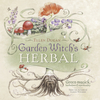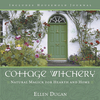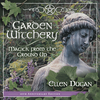Garden Witchery for Summer and Autumn

As we roll into the last weeks of summer and anticipate the cooler days of autumn, an amazing amount of natural magick and garden witchery supplies become available to us. These materials can easily be found growing in the backyard Witch's garden, or thriving in pots and containers set around the porch or patio. Magickal plants are much more common than most people realize. Take a closer look at the plants, flowers, and trees in your neighborhood—there is an incredible array of natural supplies that can be incorporated into your own style of garden witchery.
At this time of year, the garden is just starting to wind down from its summer display. The culinary herbs, blooming annuals, sunflowers, black-eyed-Susans, roses, butterfly bushes, and coneflowers are still holding on and will continue to thrive through the hottest days of late summer. In just a few more weeks, the emphasis will shift in the garden, and it begins to look more blowsy, casual, overgrown and wild. In the fall garden, there is a focus on texture—from ornamental grasses to showy seedpods on the faded coneflowers and black-eyed-Susans, which the birds will make good use of. Then, the deeper more jewel-toned colors of the berries, changing foliage, chrysanthemums, and sedum will begin to take center stage.
Why not save yourself some time and money, and take a look at what is available to you in your own backyard? Garden Witchery is fun, and it's a great way to connect to the earth. Plus I'll let you in on a little secret; It's much easier than you think. Put exotic and hard-to-find plants right out of your mind. This type of earthy magick is simple and works with common garden plants, trees, perennials, and annuals. Here is a great example. You know those pots of annuals you've had growing on your porch all summer? Chances are they are filled with flowers you could easily use in earthy spells and charms.
Do you have any geraniums growing out there? You can work with red geraniums for a fast and simple floral spell to promote protection. And while we are on the subject of geraniums, the other different colors of this annual flower have their own magickal correspondences too. For instance, white geraniums will promote fertility. Bright pink geraniums encourage passion and love, and coral ones increase vitality and energy. If you've got a shady spot and have been growing impatiens, (some folks call these flowers Busy Lizzy), add those tender blossoms into spells and charms to help "speed things up." The folk name for impatiens is "touch me not"—so handle those blossoms carefully because they bruise easily. Go on, gather a flower or two from the garden and incorporate them into your spellwork.
To get you inspired, here is a Garden Witch's list of favorite late summer and autumn bloomers that you can slip in to your seasonal magick and witchery.
Late Summer Flowers
- Aster (aster hybrids.): Also known as Michaelmas daisies, asters come in gorgeous shades of blue, white, pink, and purple. The aster is sacred to most of the Greek pantheon, and attracts butterflies to your yard. According to flower folklore the aster conveys the message of variety, delicacy, and patience. Incorporate asters into spells and charms to enhance loving vibrations and healthy emotions. Adding these beautiful flowers to your garden brings love and contentment to your entire household. The aster prefers a sunny location and likes moist, well-drained soil. USA cold hardiness zones 4-9
- Black-eyed-Susans (Rudbeckia): These drought-tolerant perennials thrive in sunny spots and are a wonderful addition to any garden by providing bold splashes of golden color from summer through fall. In the language of flowers they symbolize "justice." So they would be ideal to add to any spells where this was an issue. The seed heads of the black-eyed-Susans are attractive to songbirds, so don't cut these back in the late fall, let the birds have them. USA cold hardiness zones 4-9
- Coneflowers (Echinacea): Purple coneflowers encourage health and will strengthen any spell work. These native flowers are tough and drought tolerant. They attract butterflies into your garden in the summer, and goldfinches to your yard in the fall and winter. Those finches love to snack on the thistles in the cones. When the flower petals whither in the fall, leave the seed heads standing for the birds. Just about the time I think I should cut them back because the flowers have faded, the bright yellow goldfinches find the seed heads. Coneflowers will perform well in full sun to part-shady conditions. (However, the more sun they get, the taller they will grow.) USA cold hardiness zones 3-9.
- Russian Sage (Perovskia atriplicifolia): Incorporate these dusky purple blossoms into charms and spells that call for wisdom and knowledge. This perennial has a wonderful sage scent and the long lasting purple blooms attract pollinators such as the honeybee. The foliage is a bluish-green, and this branching perennial may grow up to 6 feet in height. Russian sage performs well in full sun and is best planted in the back of the border—give it lots of room to grow. USA cold hardiness zone 4-9
- Sunflowers (Helianthus annuus): This annual flower has been honored as a symbol of the sun for thousands of years. Magickal uses include, truth, fame, recognition, and granting wishes. Sleeping with a sunflower beneath your pillow will tell you the truth of any matter. The annual sunflower is easy to grow and will require lots of fertilizer, they are heavy feeders. The height of the sunflower will depend on the variety. Anywhere from 2 to 10 feet in height. Sunflowers will not winter over, but save a few of the seeds and plant them next spring if you like. Birds love the sunflower seeds for a snack, so after they fade in late summer/ early autumn, save and dry the seed heads for a winter treat for the birds.
- Zinnias: These are easy annuals to grow from seed. These colorful flowers attract lots of butterflies into the late summer sunny garden. In the language of flowers, the zinnia symbolizes "faraway friends." A great flower to use in any floral fascination (spells worked with fresh flowers), or spells designed to begin a new friendship or to help cool off feuding friends. Zinnias are available in a rainbow of colors. This makes coordinating your color magick with your flower fascinations a snap.
Fall Flowers
- Autumn Clematis (Clematis paniculata): In the language of flowers, the clematis stands for the beauty of the mind and ingenuity. Work a tiny blooming cluster or two this fall into enchantments that call for a little cleverness and resourcefulness. This free-flowering vine blooms in tiny snow-white clusters of fragrant blossoms in the autumn months. The 15-25 foot vines are aggressive and grow quickly, so keep it trained on an arbor or fence. If it starts to get away from you, it can be clipped back to a manageable size in the spring. This plant blooms on new growth, in the fall. USA cold hardiness zones 4-8
- Chrysanthemum (Dendranthema hybrids): These blossoms are affectionately known today as "mums." The name of this flower comes from the Greek words chrysos meaning gold, and anthos meaning flower. These "golden flowers" of the fall are classics for the autumn garden. In ancient times Greeks would wear garlands of chrysanthemums to keep away those dreaded "evil spirits." For the modern Garden Witch, the mum is a fabulous, protective fall flower that wards the home and keeps away wandering ghosts. Since they are available in a wide range of jewel-toned colors, you can match the color of the mum to specialize your floral spellwork. In the language of flowers, the mum brings"cheer," plus the different colors of the chrysanthemum all have specialized meanings. Red mums mean, "I love you." White signifies "truth," and yellow means "happiness." For the other available jewel tones I would go with "energy and bounty" for the orange mum. A "happy hearth and home" for the bronze colors. The amethyst-colored mum could be added to spells worked to promote "power and protection." The chrysanthemum grows best in full sun, and likes well-drained, rich soil. USA cold hardiness zones 4-9.
- Morning Glory (Ipomoea): The morning glory is an old-fashioned, fall-blooming annual vine. It is available in a wide range of colors from white, pastel shades of pink, and blue to true blue and deep purple. In the language of flowers, the morning glory "greets the new day." Also any truly blue flowers are sacred to the goddess Aphrodite. For flower fascinations, use the blue blossoms for love, peace, and for promoting mental health. The morning glory is associated with the planet Saturn, which means that foliage, vines, and blossoms can and be incorporated into protection spells. Try the deeper blue and purple colored varieties to safeguard your home or property. Morning glories grow well in full to part sun. Be sure to keep them well watered during the hot, dog days of late summer.
- Pansies (Viola): These cool-temperature-loving flowers are sacred to Eros/Cupid. Pansies have many folk names, including kiss-me-at-the-garden-gate, love-in-idleness, Johnny jump-ups, and heart's ease. According to legend, the god Eros accidentally shot one of his love-inducing arrows into the pansy, causing it to smile. The happy face of the pansy has been grinning ever since. These sassy, multi-colored flowers are incorporated into garden witchery spells and charms for easing a broken heart and for spreading cheer. Pansies are wonderful in the garden or tucked into pots and containers for seasonal color. If planted in the ground in the fall and then mulched with leaves in early winter, pansies will bloom again the following spring. Here's a fun Garden Witch tip; during the fall months look for the "Trick or Treat" variety. These pansies are a mixture of orange, black and purple colors, and absolutely enchanting to add to your garden just in time for Halloween/ Samhain.
- Pineapple sage (Salvia rutilans): This tender perennial is a wonderful blooming herb. In the language of flowers, the pineapple sage represents "hospitality." So work the scented foliage into charm bags to promote a "happy home" vibe for your place. This fabulous herb starts out as tiny bedding plant and then grows into shrub size by the autumn months. The pineapple sage's blossoms probably won't appear until after the autumn equinox, but once they do, those red tubular shaped flowers will attract lots of hummingbirds. Pineapple sage is classified as a "tender perennial," which means it will not survive most cold winters. However, I feel that the show the hummers put on is well worth the cost of re-planting it each year.
- Sedum One of my favorite varieties of sedum is the "Autumn Joy." Folk names for this plant include Betty's bustle, but most folks know this autumn classic as Stonecrop. In the language of flowers, the sedum announces, "welcome and tranquility." Incorporate the sedum into charms and spells that encourage a peaceful marriage and happy home. The waxy, succulent looking foliage of the sedum bears clusters of flowers that start out pale green and eventually turn to a rosy pink. Bumblebees and butterflies adore these autumn flowers. As the nights grow colder the flower color will eventually turn to deep mauve and then to burgundy-brown. This plant makes for great architectural interest in a winter garden, when covered in snow or ice. Sedums are very easy to grow, long lived, make great cut flowers, and are drought tolerant. The plant thrives in full sun and grows 18-36 inches in height. USA cold hardiness zones 3-9.
Would you like to learn more about herbalism and the magick of flowers? Well, go outside and get your hands dirty right now! Tie up some pretty flowers and gorgeous foliage into enchanting Tussie-Mussie bouquets. Stuff bewitching flower petals and fragrant herbs into charm bags for protection, love, and prosperity. Oh, and be sure to set some of these enchanting flowers in vases and jars around the house, so their magickal energy is spread throughout your home. Work with fresh flowers and foliage, straight from the garden, and conjure up some seasonal spells and charms of your own design this year. Happy Magickal Gardening!
For more information about flower fascinations, the language of flowers, charm bags, and Tussie-Mussies, and even more garden magick ideas—refer to my book, Garden Witchery: Magick from the Ground Up.

About Ellen Dugan
Related Products



is subject to certain Terms and Conditions